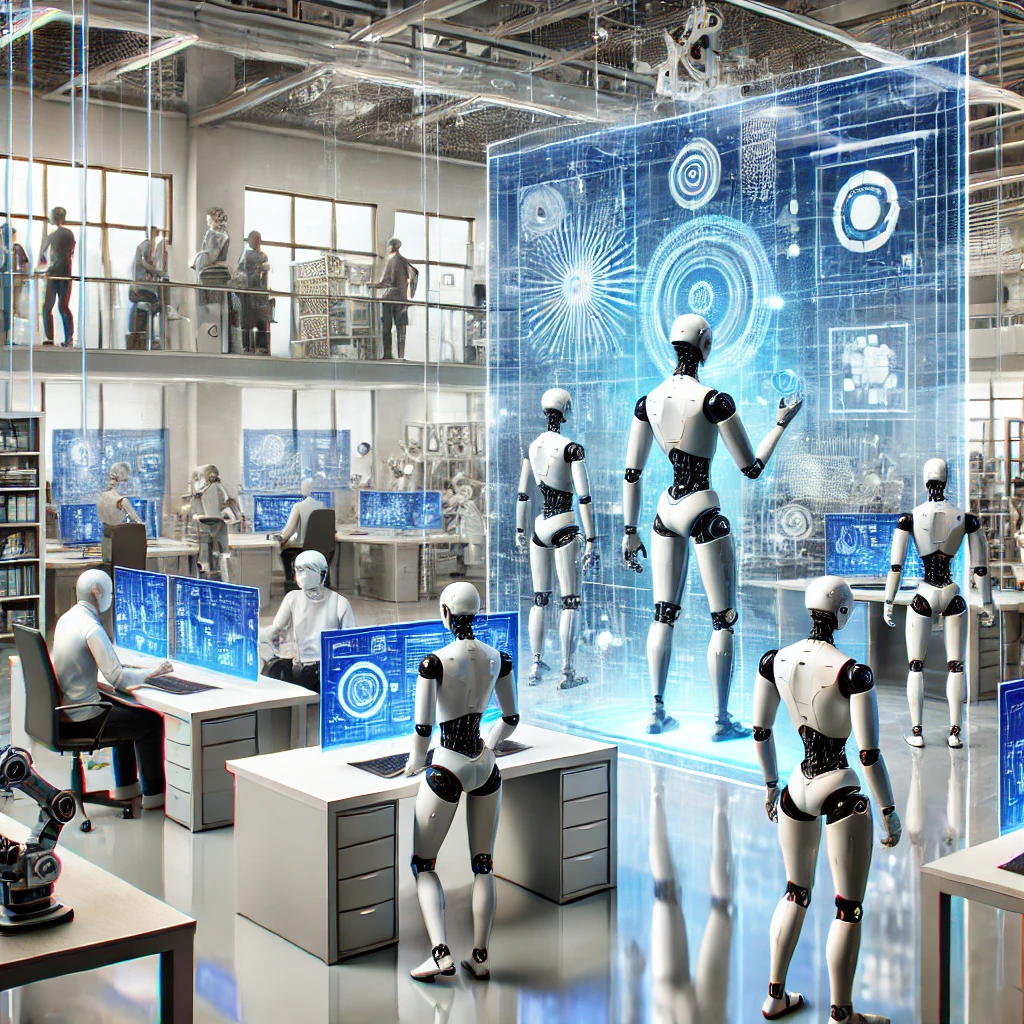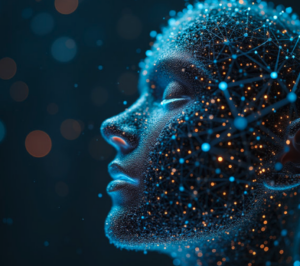
Explore how AI is revolutionizing industries, transforming the workplace, and shaping the future of work. Learn how businesses and workers can adapt to these changes.
The Rise of AI in the Workplace
Artificial Intelligence (AI) is not just a buzzword anymore. It’s a transformative force that is revolutionizing industries, reshaping the workplace, and redefining the future of work. With AI, businesses can improve efficiency, streamline operations, reduce costs, and enhance the customer experience in ways that were previously unimaginable.
AI technology is evolving rapidly and its applications are already evident in various industries such as healthcare, finance, manufacturing, retail, and customer service. Whether it’s automating repetitive tasks or providing real-time insights to improve decision-making, AI’s impact on work is undeniable.
However, as AI takes center stage, it also presents challenges, including concerns over job displacement, workforce reskilling, and ethical considerations. This article explores how AI is revolutionizing industries, what this means for businesses and employees, and the potential opportunities and challenges that lie ahead as AI continues to evolve.
AI in Different Industries: A Game-Changer
1. AI in Healthcare: Transforming Patient Care
The healthcare industry is one of the most promising sectors where AI is making a huge impact. With its ability to analyze vast amounts of medical data, AI is enhancing diagnostic accuracy, improving patient care, and accelerating the pace of medical research.
-
Precision Medicine: AI is driving the revolution in precision medicine, where treatment plans are customized based on a patient’s unique genetic makeup, lifestyle, and medical history. This personalized approach ensures more effective treatments, fewer side effects, and better overall health outcomes.
-
Medical Imaging and Diagnostics: One of the key applications of AI in healthcare is in medical imaging. AI algorithms are capable of detecting diseases such as cancer, heart conditions, and neurological disorders from medical images with a level of precision that matches or even exceeds human experts. This ability allows for earlier detection of diseases, leading to better prognoses and more efficient treatment.
-
AI in Drug Discovery: Traditional drug discovery is a time-consuming and costly process. AI is revolutionizing this field by analyzing large datasets to identify promising molecules, predict their effectiveness, and determine potential side effects. This reduces the time it takes to bring new drugs to market and lowers the cost of research and development.
While AI offers significant benefits, it also raises challenges, such as the need for privacy protection in the handling of patient data, ensuring the transparency of AI algorithms, and addressing potential biases in the data used to train AI models.
2. AI in Finance: Automating Decision-Making and Enhancing Customer Experience
In the financial sector, AI is being used to enhance decision-making, improve operational efficiency, and provide personalized services. By leveraging AI technologies, banks and financial institutions can automate routine tasks, reduce risks, and provide better customer service.
-
Algorithmic Trading: AI-powered trading systems can analyze vast amounts of market data in real-time, detecting patterns and trends that would be difficult for human traders to spot. These algorithms can make split-second decisions about buying and selling assets, improving market efficiency and potentially increasing profitability for investors.
-
Fraud Detection: AI is helping financial institutions detect fraudulent activities by analyzing transaction patterns and identifying anomalies. Machine learning models can flag suspicious transactions almost instantly, reducing the risk of fraud and financial loss.
-
Personalized Financial Advice: AI chatbots and virtual assistants are increasingly used by financial institutions to provide customers with personalized financial advice. By analyzing customers’ spending habits, savings goals, and investment preferences, these AI systems can offer tailored advice, helping customers make smarter financial decisions.
Despite these advancements, the financial sector must ensure that AI systems are transparent and free from bias, as well as take measures to safeguard sensitive customer data.
3. AI in Manufacturing: Revolutionizing Production Lines
Manufacturing is another sector undergoing a major transformation due to AI. AI-powered systems are streamlining operations, reducing downtime, and improving product quality. The integration of AI into production lines is leading to smarter, more efficient factories.
-
Predictive Maintenance: One of the biggest benefits of AI in manufacturing is predictive maintenance. AI systems can monitor the performance of machinery in real time, predict when parts are likely to fail, and schedule maintenance before problems arise. This minimizes downtime and ensures that production processes run smoothly, ultimately reducing costs.
-
Robotic Automation: AI-powered robots are now being used in factories to perform tasks that were once dangerous, repetitive, or labor-intensive. These robots can work around the clock without the need for breaks, improving productivity and reducing the risk of human error.
-
Supply Chain Optimization: AI is transforming the supply chain by enabling real-time tracking, inventory management, and demand forecasting. By analyzing data from various sources, AI can predict future demand, optimize stock levels, and ensure that materials and products are delivered on time. This leads to reduced costs and more efficient operations.
However, the increased automation in manufacturing raises concerns about job displacement, especially in low-skill, repetitive jobs. Workers will need to acquire new skills to stay relevant in a rapidly changing job market.
4. AI in Retail: Enhancing the Shopping Experience
AI is revolutionizing the retail industry by improving customer experiences, optimizing inventory, and driving sales. Retailers are leveraging AI to create personalized shopping experiences and enhance their operational efficiency.
-
Personalized Recommendations: AI is helping retailers provide highly personalized shopping experiences. By analyzing consumer data, such as browsing history, preferences, and past purchases, AI algorithms can recommend products tailored to individual customers, increasing the likelihood of a sale.
-
Inventory and Demand Forecasting: AI is also used to optimize inventory management. By analyzing sales trends, weather patterns, and other variables, AI can predict future demand with remarkable accuracy. This helps retailers avoid stockouts and overstocking, ensuring they have the right products available when customers need them.
-
Chatbots and Virtual Assistants: Retailers are using AI-powered chatbots and virtual assistants to provide 24/7 customer support. These systems can handle everything from answering product-related questions to assisting with order tracking and processing returns.
As AI continues to shape the retail landscape, the role of human employees will likely shift towards higher-value tasks, such as customer relationship management, while repetitive tasks become increasingly automated.
5. AI in Customer Service: Streamlining Operations and Enhancing Experiences
AI is transforming the way businesses interact with their customers, especially in the customer service sector. With AI handling routine queries and tasks, businesses can offer faster and more personalized support to their customers.
-
Automated Support and Chatbots: AI chatbots are being deployed across industries to handle customer inquiries, solve problems, and provide 24/7 support. These bots can process hundreds or even thousands of inquiries simultaneously, ensuring that customers receive prompt responses.
-
Voice Assistants: Voice-activated AI assistants like Amazon’s Alexa, Google Assistant, and Apple’s Siri are being increasingly used in customer service to handle voice queries, schedule appointments, and help customers navigate products and services.
-
Sentiment Analysis: AI tools can analyze customer feedback, reviews, and social media posts to gauge customer sentiment. By understanding how customers feel about products or services, companies can address issues before they escalate and improve overall customer satisfaction.
As AI technology becomes more advanced, businesses must find the balance between automation and human interaction to ensure that customers still feel valued and heard.
The Impact of AI on Employment: Opportunities and Challenges
Job Displacement vs. Job Creation
AI has the potential to displace certain jobs, especially those that involve repetitive tasks that can easily be automated. Jobs in areas such as data entry, telemarketing, and routine customer service are at risk of being replaced by AI-driven systems.
However, AI also has the potential to create new jobs. According to the World Economic Forum, AI and automation could displace 75 million jobs by 2022, but they could also create 133 million new roles. These roles will require workers to have new skills in areas like data analysis, machine learning, AI development, and robotics.
As AI continues to grow, workers will need to acquire new skills to remain competitive in the workforce. Governments, businesses, and educational institutions must invest in retraining and reskilling programs to help workers adapt to the changing job market.
The Rise of Human-AI Collaboration
Rather than replacing humans, AI is increasingly seen as a tool for collaboration. In many industries, AI is being used to augment human abilities rather than replace them entirely. For example, in healthcare, AI can assist doctors with diagnostics, but doctors will still be needed to interpret results and make treatment decisions. Similarly, in finance, AI can analyze vast amounts of data to identify trends, but human financial advisors will still play a role in offering personalized advice.
This shift towards human-AI collaboration creates opportunities for workers to focus on more complex, creative, and strategic tasks, while leaving repetitive, mundane work to AI.
Navigating the Future of Work with AI
The future of work with AI is one of transformation and collaboration. As AI continues to reshape industries, it will unlock new opportunities for innovation, efficiency, and productivity. However, it is also essential that businesses, employees, and policymakers work together to address the challenges that arise, such as job displacement, ethical considerations, and the need for upskilling.
AI will not replace humans but will complement human skills, empowering workers to focus on higher-value tasks that require creativity, empathy, and critical thinking. The future of work lies in striking the right balance between leveraging AI’s capabilities and ensuring that the workforce remains adaptable, skilled, and ethically responsible.
As AI becomes more embedded in the workplace, society must take proactive steps to ensure that its benefits are shared equitably, and that the potential risks are mitigated. The future of work is undoubtedly exciting, but it requires careful planning, investment in human capital, and thoughtful governance to ensure that it benefits all.
FAQs:
-
How is AI changing the workforce?
AI is automating repetitive tasks, improving efficiency, and enabling workers to focus on more creative, strategic, and complex activities. While some jobs may be displaced, new roles are being created that require more advanced skills. -
Which industries are being most impacted by AI?
AI is having a major impact on healthcare, finance, manufacturing, retail, and customer service. Each of these industries is leveraging AI to improve operational efficiency, enhance customer experiences, and drive innovation. -
Will AI replace all jobs in the future?
While AI will automate certain tasks, it is unlikely to replace all jobs. Many jobs will evolve to involve more creative, strategic, and complex tasks. Human workers will still be needed to collaborate with AI systems. -
What are the ethical concerns surrounding AI in the workplace?
Key ethical concerns include job displacement, bias in AI algorithms, data privacy, and ensuring transparency in AI decision-making processes. Businesses must address these issues to ensure AI is used responsibly. -
What skills will be in demand as AI grows?
As AI grows, there will be increased demand for skills in data analysis, machine learning, AI development, robotics, and AI ethics. Workers will need to focus on continuous learning and upskilling to stay relevant in the job market. -
How can businesses prepare for AI adoption?
Businesses should invest in AI literacy, retraining programs, and develop ethical guidelines for AI use. This ensures that AI is deployed responsibly and that employees are equipped to work alongside AI systems. -
Is AI creating new job opportunities?
Yes, AI is expected to create new job opportunities in fields like AI development, machine learning, data science, and AI ethics. These roles will require a higher level of technical and cognitive skills. -
How does AI impact customer experience?
AI improves customer experiences by offering personalized recommendations, faster support through chatbots, and efficient services like automated customer service and AI-driven product suggestions. -
What risks does AI pose to privacy?
AI systems often process large amounts of personal data, which raises concerns about data privacy. Businesses must implement robust data protection measures and comply with privacy regulations to mitigate these risks. -
What is the future outlook for AI in the workplace?
The future of AI in the workplace is one of collaboration between humans and machines. While AI will automate certain tasks, it will also augment human capabilities, enabling workers to focus on more complex and value-driven work.



